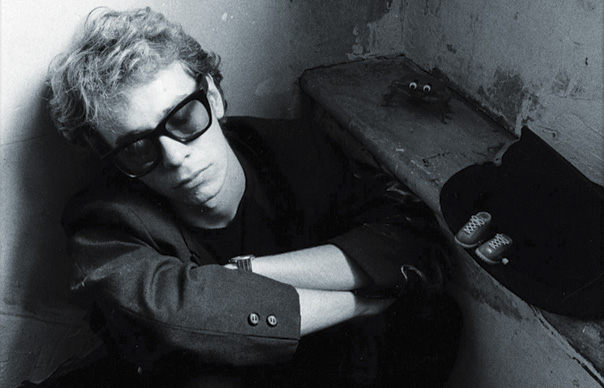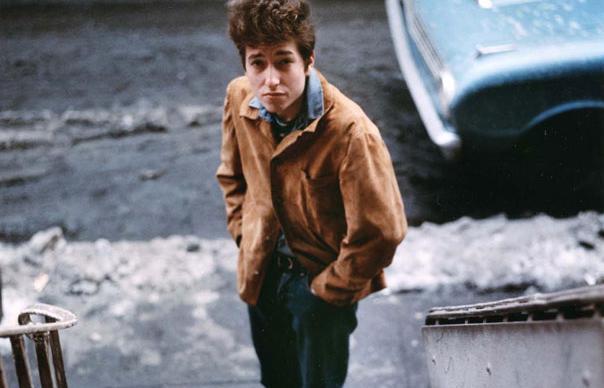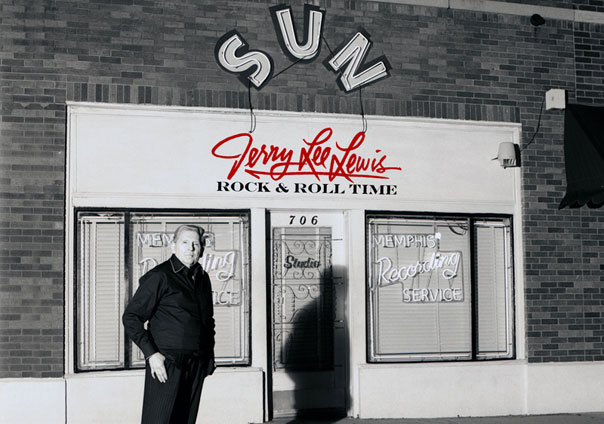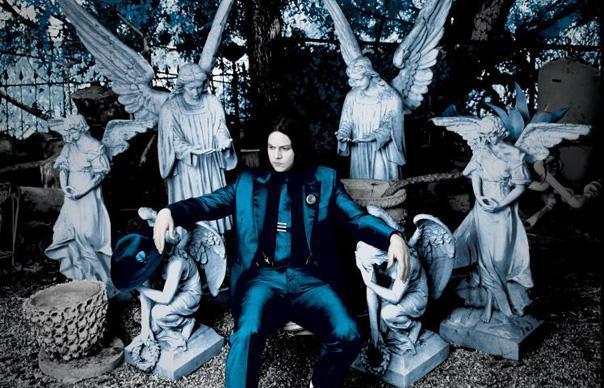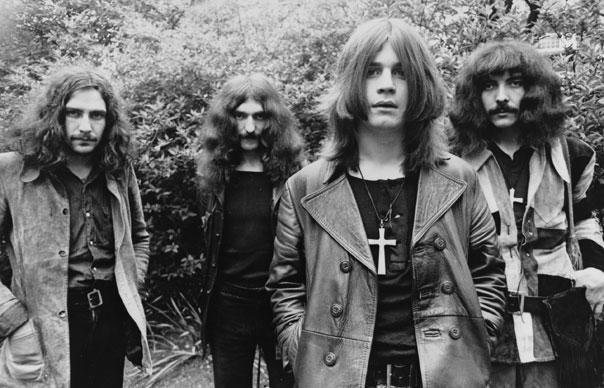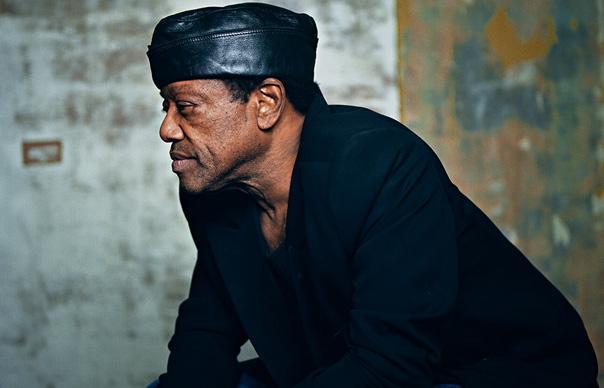In this month's Uncut, I reviewed the deluxe edition of The The's Soul Mining, which has been reissued as a box set with additional material. I was fortunate enough to speak to Matt Johnson for a Q&A to run with the review. In the end, we ended up talking for about an hour, so I thought I'd post the full transcript of my interview here. I hope you enjoy it. I'll endeavour to post the review itself in the next week or so; better still, you can find it in the issue on sale now... (apologies for the shameless plug...) __________ Can we pick up the story with the release of the previous album, Burning Blue Soul. It’s quite an intense record. Where was your head when that came out? I was very busy at the time. Although Burning Blue Soul went out under my own name, I also had The The going as a parallel thing, although there were only two people. I later went back to Burning Blue Soul and retitled it as a The The album. At that point, I was playing everything and writing everything. It had become a band in name only and Keith Laws, my partner, left shortly after. I had so much energy. Keith Laws and I had worked in a studio since I was 15, and I released a single [“Controversial Subject” on 4AD] before I was 18 and then a single for Some Bizarre [“Cold Spell Ahead”]… so I was dealing with lots of companies at the time. Rough Trade a lot, Cherry Red, 4AD. I was anxious to get on with things. What were your circumstances? I was on the dole, I had a tiny bedsit and no money. Burning Blue Soul was done for £1,800. I was so hard up for money in those days I even recorded over the multi tracks. I would beg, steal or borrow time at the studio I used to work for [De Wolfe]. I was working on a follow-up album called Pornography Of Despair. It was more commercial – more accessible is a better word – though I wouldn’t use that title these days, I suppose. The record was a step forward. I was very influenced around the time of Burning Blue Soul by things like music concrète and playing with tapes – this was before samplers were invented and so we’d use tape loops. I’d learned how to do tape manipulation at DeWolfe – there were some good guys there. There was a wonderful book by a guy called Terence Dwyer called Composing With Tape Recorders and that became a bit of a bible for me. I’d saved up and bought a little reel to reel tape recorder and so I had little razor blades to make the tape loops and so I used to create all this stuff – unusual percussion loops and a lot of third world instruments. That fed in to Burning Blue Soul along with the few foot pedals I was able to afford – I think I only had a distortion pedal, a tremolo pedal and an echo pedal, and maybe a wah-wah. It was a very limited tonal palate. I was very inspired by John Lennon and people like Tim Buckley. So I wanted to express myself more at the standard soul format more than necessarily doing stuff that was too experimental. The Pornography Of Despair was heading in that direction. Around about that time, I’d done that record – I hadn’t properly mixed it, I think I’d done rough mixes – Some Bizarre achieved a huge amount of success with Soft Cell. The label boss, Stevo, had a lot of clout with the major labels and so he got loads record companies interested in The The. I was a part of Polygram in those days and London Records paid for me to go to New York to work with Mike Thorne who had produced Soft Cell’s “Tainted Love”. He’d also produced a couple of Wire albums. I knew the guys from Wire. They’d produced my first single and a couple of the tracks on Burning Blue Soul, so there was that interesting connection. http://www.youtube.com/watch?v=-BTZRW27DIg What happened when you got to New York? “We started Soul Mining over there. But Stevo actually got London Records to pay for me to fly to New York to work with Mike – all the studio time, the whole cost – without signing anything. It was done on a handshake. As soon as we got back, we jumped out of the handshake deal with London and Stevo started touting round other labels. CBS became interested. In those days, CBS were like the equivalent of Manchester United, I suppose. They were a very, very glamorous record company. They had the likes of Bob Dylan, Leonard Cohen, Johnny Cash, so… that was very appealing. I really liked the people who worked at CBS, they were really friendly, they seemed to like me. “But then I went back to New York to work with Mike Thorne again and the trip disintegrated into absolute chaos. There were all sorts of drugs involved… it was a bit mad. It was not fair on Mike; he was trying to put the session together. I was completely out of my head, I was only 21 or something, walking around and bumping into things. I didn’t know where I was. “We did manage to get some things done. Then Stevo and I headed off to Detroit of all places. ‘Where’s the most dangerous place in America, where can we go that’s even more dangerous than the Bronx and Alphabet City? I know, let’s go to Detroit!’ “CBS were quite alarmed. They’d heard ‘Uncertain Smile’ but at that point I don’t think at that point they’d even heard Burning Blue Soul. I don’t know what they thought, but suddenly they heard the stories, hotel rooms being trashed, and they were a bit horrified. Then Stevo fell out with Mike Thorne over something or other, I’m not sure what. We decided that I would be co-producer, and from then on I always was producer or co-producer for myself. We got in Paul Hardyman, who was absolutely brilliant. He’d worked with Mike a lot with The Wire. “The first thing we did together was remix ‘Perfect’. I was happy with the sounds that we got. There was a lot of beef to it, and clarity. Then we decided to proceed to remake the album. We hunted for studios and we found The Garden Studio, which had only recently opened. It was owned by John Foxx. I ended up buying it. I closed it about a year ago. The last album that was done there was Goldfrapp’s last album – I wanted to end on a high – and then I shut it down. When I first got in there I absolutely fell in love with it. It was a basement studio. John Foxx had created it with a chap called Andy Monroe, who went on to become a very famous studio designer. They really got the old Feng Shui, everything felt good down there. I ended up using it for many albums over the years. So that’s primarily where we recorded, but we did do some bits and pieces up at Advision and Sarm East. How old are the songs on Soul Mining? “I was just a teenager when I wrote some of the songs. It’s a very young album. ‘Uncertain Smile’ grew out of ‘Cold Spell Ahead’, so I probably wrote that when I was 18. ‘Perfect’ was probably written when I was 19, but that didn’t make the final cut of the album. I would have been 18 or 19 when I wrote ‘Sinking Feeling’. The more recent songs were ‘Twilight Hour’, ‘Soul Mining’, ‘Waiting For Tomorrow’ and ‘Giant’. And ‘This Is The Day’… I was 20 when I wrote that.” What themes did you want to explore on the record? “I think in those days I wasn’t really thinking… when you’re doing your early album you just write. You have songs that you’ll possibly be working on for years. Later on, once you’ve established yourself and released numerous albums then you can approach a project and place certain parameters over the general subject matter. In the early days it’s all very instinctual, just how you feel. I grew up listening to John Lennon and The Beatles. Lennon used to say ‘Tell the truth and make it rhyme.’ You can’t get simpler advice than that. That’s what I always wanted to do, be truthful. ‘This is how I feel at this moment in time.’ Rather than worrying about intellectualising it.” There’s a line in the sleeve notes where you talk about wanting to “accurately capture the thoughts and feelings that seem to be bursting out of my head and heart”. I wondered whether you could identify specifically what those thoughts and feelings were? “At that time, I was quite shy, unlike these days. There was a lot of unrequited love, I suppose. Although I had fallen in love around Soul Mining. So the earlier songs were unrequited, but the next songs I experienced more satisfaction in my personal life.” http://www.youtube.com/watch?v=phWv7l8Lm_A Which songs dealt with unrequited love? “‘Uncertain Smile’ would be one. ‘Twilight Hour’ would be the initial stages of the relationship. The insecurities. That awful, terrible rollercoaster ride where the walls are initially dissolving in the relationship and you’re somewhere between pure euphoria and then this terrible insecurity that keeps you awake at night. I don’t miss those big feelings today, to be honest. When you feel that you’ve had several layers of skin removed and you’re ultra sensitive to everything, to something somebody may say, and you misunderstand the situation… there’s a lot of misunderstanding! ‘Waiting For Tomorrow’ is more about cognitive dissonance. About this world that’s constructed for us by the media. I’m able to switch off and not be affected by the propaganda but in those days it was very confusing. You’re experiencing one thing in your life and then the institutions and news services that you think you should trust are are showing you something completely different. So there’s the internal conflict and confusion. “‘Blind’, for me that song is not necessarily about what the lyrics say. I wanted something very cinematic and atmospheric and dreamlike, and scenic really, and uplifting. Although I’d got myself a sort of reputation in certain quarters for songs that were moody or depressing, but people found it uplifting. ‘This Is The Day’, ‘Smile’ and ‘Giant’, they’re also supposed to be uplifting, but thoughtful. A poignant reflection. I’ve never been a depressed person, in spite of what was written about me. I’ve suffered more from sensitivity. I feel moved by injustices and the unfairness I see around me, and I don’t see how anyone can feel completely happy when their fellow beings are suffering. “It’s hard going back. I don’t have copies of my own records to be honest, I don’t listen to them, and I hadn’t heard this album for years. I think I’ve got copies down at my dad’s. It’s an odd thing; I just had to move on really. But the first time I heard it when we went back to master it, it was great. I kept my head clear, I wanted to approach it a fresh. I was a bit worried that I might cringe, but I was really happy. I was this 20-year-old kid when I wrote this. It’s a difficult age, isn’t it, your teens and your early twenties? It’s quite an intense and confusing period, where you’re trying to establish a self-identity. And your relationship with other people… there’s a lot of mention of unrequited passions. The energy that would have gone into relationships went into music.” Who did you consider your peers at the time? “like a lot of those guys like the Bunnymen and the Teardrops. There was this amazing series of gigs in the old YMCA, around about that time. I guess it was ’81. There was such a great line-up. You had The Fall, Throbbing Gristle, Echo and the Bunnymen, Teardrop Explosion, and Joy Division. It was incredible; all those bands were brought together. “I was a big fan of the post-punk underground. Cabaret Voltaire, Wire, This Heat – who we became friendly with. They used to let us go to the studio. Wire and This Heat took us under their wing a bit really, which was fantastic. They would let us watch them rehearse. This Heat, as musicians, were incredible. They were great players and they were very, very cool guys. They were quite hippy-ish. They’d sit around drinking pints of real ale. I loved all those gigs all the time. I used to sell my first album there. Those were my roots, and they were my peers.” You’ve got an impressive list of guests on Soul Mining: Jim Thirlwell, Thomas Leer and Zeke Manyika. How did those guys become involved? “I’ve known Jim [Thirlwell] since we were teenagers. He is possibly my closest friend in the music business. He came from Melbourne and he lives in Brooklyn now, but then he was living in London. The first gig The The played was at the Africa Centre in May ’79 and he was in the front row of the audience. I didn’t know him at this time, but I recognised him from all the underground gigs I used to go to. He was quite a striking looking chap anyway but at the time he had this green, bouffant hairstyle. Keith [Laws] and I didn’t know who he was so we used to call him Chickenhead. On stage, we used to say to each other, ‘Chickenhead’s here again today.’ He came to all our gigs. I was at a Cherry Red Christmas party, I think I’d just signed to their publishing company, and the owner Iain McNay said to me, ‘Matt, you’ve got to meet Jim Thirwell, you and he are gonna to along so well.’ So he took me round the corner and said, ‘Here’s Jim,’ and I thought to myself, ‘It’s Chickenhead!’ We became very close. I loved his Foetus recordings, and I wanted to get him involved [in Soul Mining]. First thing I did with him was a residency at the old Marquee Club, I formed a supergroup, and Jim was involved in that. “Thomas Leer was a big influence on me I invited him to join the supergroup, too. He’s a fantastic guy, Scotsman, with a very dry sense of humour. Zeke was drumming with Orange Juice at the times. He became a drinking buddy, we quickly formed a very close friendship. http://www.youtube.com/watch?v=xR2ImlS3v3c Can you tell us how Jools Holland came to play his piano solo on "Uncertain Smile"? “I think my A&R lady Annie Roseberry, might have suggested Jools. The Garden had this beautiful little Yamaha C3 Baby Grand, and the decision was, ‘We have this fantastic long outro for ‘Uncertain Smile’. We need to put this piano on something. Who do we know who can play it?’ Jools showed up, cool as a cucumber despite the sweltering heat, dressed in leathers, and he was absolutely charming. He was a lovely man, and very unassuming and friendly. He sat down and it was astonishing, I think he had one run-through, said ‘Let’s go for it’ and just laid the whole thing down. There was just one drop-in we did towards the end, and we were just amazed. He told me years later he gets asked about that more than anything he’s ever done, which probably gets on his nerves now, it’s astonishing. What about David Johanson, who played on “Perfect” from the New York sessions? “This was when we were in New York. Mike Thorne knew him. I’d said I’d like some harmonica on “Perfect”, and did Mike know any good players. He said, ‘Let’s ask David Johansen.’ He was doing his Buster Poindexter –project. I was slightly apprehensive. I didn’t know what he was going to be like. But he was wonderful, very funny guy. Warm, quick-witted, pleasant to spend time with. It was a really enjoyable session. “There were a lot of well-known session players, a chap called Wix, he played the accordion – I think that was first-take as well – he was brilliant. He ended up joining Paul McCartney’s band. Of course, Zeke played drums as well as doing some vocals. It was one of those things where we didn’t have a set band at the time. I wanted to avoid that bass, drum, two guitars set-up.” How did you feel about the finished album at the time? “I was thrilled. We mixed it at Martin Rushent’s studio, Genetic Sound. Paul was a pleasure to work with. He was extremely professional, kept copious notes, very old school the way he approached things. Burning Blue Soul was a fantastic experience, and Ivo was brilliant, but of course because we’d just have the odd day here and there – it was such a tiny recording budget –I didn’t have the luxury of taking time over the sounds and working slowly and effectively. So I was really thrilled to have this expensive-sounding album. It would have been 30 or 40 times what Burning Blue Soul was. I think the most expensive album I made was Mind Bomb which was hundreds of thousands. It was crazy. Yeah, hundreds of thousands.” Are you a perfectionist? “I used to be, but I’m not anymore. I’ve been doing quite a lot of film scores and you just can’t do. There are a lot of tight deadlines. I used to literally drive drummers to tears. I would come home from the studio and all through the night I’d have my headphones on, listening, and my poor girlfriend would be trying to sleep and I’d be taking notes. Let’s talk about the Soul Mining box set. There were extra tracks on the original cassette version of the album. Why aren’t they included here? “They belonged to The Pornography Of Despair. When I signed to CBS they said, ‘What material have you got beyond Soul Mining?’ I said ‘Well, there’s this…’ They replied, ‘OK, can you re-record it to make it more commercial.’ So The Pornography Of Despair would be my first album for CBS. Then I was tempted to re-record the tracks but, they weren’t strong enough to be the next album. But they’d lost a lot of the grit, the urgency, of the original Pornography Of Despair album, so they ended up as B-sides. “I know a lot of people liked those tracks, but for putting this release together I wanted to go the purest route. This is just about Soul Mining’ not with bits of The Pornography Of Despair tacked on. I am going to release The Pornography Of Despair. At the moment I’m going through my archives. I’ve just taken delivery of the dehydration unit… there’s a science to all this stuff. So the room’s being set up at the moment and tapes are being delivered but a lot of them are unmarked. I’m digitising the tapes as I go through them.” Where do you think Soul Mining fits into the broader body of your work? “It’s one of the crucial foundation projects really. People often talk about that ‘quartet’ of albums I did for CBS. The hard thing for me is that I get people complaining that I haven’t bought a new album out, and then when I do they complain that it doesn’t sound like the last one. I try to make each album very unique, so they all really just sound like themselves.” What are your future plans? “I’ve just finished the score for Hyena, which opened the Edinburgh Festival. I’ve just had a premiere at Hot Docs in Toronto. Their sleeves are being done and they’ll be released at some point over the next six months to a year. I’ve got a small book publishing company. I published my first book of 2012. That was my dad’s memoirs. My parents ran east London’s most popular music house in the ‘60s, and my uncle Kenny was one of London’s top promoters, he promoted people like John Lee Hooker, The Kinks, Jerry Lee Lewis, Gene Vincent. There’s a documentary being made about that. There’s a lot going on. “I’m working on this Swedish project which has got funding from the Swedish arts council, which is a media project which involves music, poetry, light installations and a documentary film. That’s quite a big project and that’ll be released as two separate CDs.” And you recently had a carnivorous plant named after you at the Chelsea Flower show… “Yeah! I’d never been there before and this chap - a lovely, lovely guy - had grown up with my music and wanted to know, would I mind having a little triffid named after me. I was quite honoured. It did take a little nip out of me when I touched it… They eat flies, small insects and small mammals and he won his 16th gold medal, he just contacted me yesterday, it was great. So lots of exciting things.” THE THE'S SOUL MINING 30TH ANNIVERSARY DELUXE EDITION IS AVAILABLE NOW FROM SONY MUSIC
In this month’s Uncut, I reviewed the deluxe edition of The The’s Soul Mining, which has been reissued as a box set with additional material. I was fortunate enough to speak to Matt Johnson for a Q&A to run with the review. In the end, we ended up talking for about an hour, so I thought I’d post the full transcript of my interview here. I hope you enjoy it. I’ll endeavour to post the review itself in the next week or so; better still, you can find it in the issue on sale now… (apologies for the shameless plug…)
__________
Can we pick up the story with the release of the previous album, Burning Blue Soul. It’s quite an intense record. Where was your head when that came out?
I was very busy at the time. Although Burning Blue Soul went out under my own name, I also had The The going as a parallel thing, although there were only two people. I later went back to Burning Blue Soul and retitled it as a The The album. At that point, I was playing everything and writing everything. It had become a band in name only and Keith Laws, my partner, left shortly after. I had so much energy. Keith Laws and I had worked in a studio since I was 15, and I released a single [“Controversial Subject” on 4AD] before I was 18 and then a single for Some Bizarre [“Cold Spell Ahead”]… so I was dealing with lots of companies at the time. Rough Trade a lot, Cherry Red, 4AD. I was anxious to get on with things.
What were your circumstances?
I was on the dole, I had a tiny bedsit and no money. Burning Blue Soul was done for £1,800. I was so hard up for money in those days I even recorded over the multi tracks. I would beg, steal or borrow time at the studio I used to work for [De Wolfe]. I was working on a follow-up album called Pornography Of Despair. It was more commercial – more accessible is a better word – though I wouldn’t use that title these days, I suppose. The record was a step forward. I was very influenced around the time of Burning Blue Soul by things like music concrète and playing with tapes – this was before samplers were invented and so we’d use tape loops. I’d learned how to do tape manipulation at DeWolfe – there were some good guys there.
There was a wonderful book by a guy called Terence Dwyer called Composing With Tape Recorders and that became a bit of a bible for me. I’d saved up and bought a little reel to reel tape recorder and so I had little razor blades to make the tape loops and so I used to create all this stuff – unusual percussion loops and a lot of third world instruments. That fed in to Burning Blue Soul along with the few foot pedals I was able to afford – I think I only had a distortion pedal, a tremolo pedal and an echo pedal, and maybe a wah-wah. It was a very limited tonal palate.
I was very inspired by John Lennon and people like Tim Buckley. So I wanted to express myself more at the standard soul format more than necessarily doing stuff that was too experimental. The Pornography Of Despair was heading in that direction.
Around about that time, I’d done that record – I hadn’t properly mixed it, I think I’d done rough mixes – Some Bizarre achieved a huge amount of success with Soft Cell. The label boss, Stevo, had a lot of clout with the major labels and so he got loads record companies interested in The The. I was a part of Polygram in those days and London Records paid for me to go to New York to work with Mike Thorne who had produced Soft Cell’s “Tainted Love”. He’d also produced a couple of Wire albums. I knew the guys from Wire. They’d produced my first single and a couple of the tracks on Burning Blue Soul, so there was that interesting connection.
What happened when you got to New York?
“We started Soul Mining over there. But Stevo actually got London Records to pay for me to fly to New York to work with Mike – all the studio time, the whole cost – without signing anything. It was done on a handshake. As soon as we got back, we jumped out of the handshake deal with London and Stevo started touting round other labels. CBS became interested. In those days, CBS were like the equivalent of Manchester United, I suppose. They were a very, very glamorous record company. They had the likes of Bob Dylan, Leonard Cohen, Johnny Cash, so… that was very appealing. I really liked the people who worked at CBS, they were really friendly, they seemed to like me.
“But then I went back to New York to work with Mike Thorne again and the trip disintegrated into absolute chaos. There were all sorts of drugs involved… it was a bit mad. It was not fair on Mike; he was trying to put the session together. I was completely out of my head, I was only 21 or something, walking around and bumping into things. I didn’t know where I was.
“We did manage to get some things done. Then Stevo and I headed off to Detroit of all places. ‘Where’s the most dangerous place in America, where can we go that’s even more dangerous than the Bronx and Alphabet City? I know, let’s go to Detroit!’
“CBS were quite alarmed. They’d heard ‘Uncertain Smile’ but at that point I don’t think at that point they’d even heard Burning Blue Soul. I don’t know what they thought, but suddenly they heard the stories, hotel rooms being trashed, and they were a bit horrified. Then Stevo fell out with Mike Thorne over something or other, I’m not sure what. We decided that I would be co-producer, and from then on I always was producer or co-producer for myself. We got in Paul Hardyman, who was absolutely brilliant. He’d worked with Mike a lot with The Wire.
“The first thing we did together was remix ‘Perfect’. I was happy with the sounds that we got. There was a lot of beef to it, and clarity. Then we decided to proceed to remake the album. We hunted for studios and we found The Garden Studio, which had only recently opened. It was owned by John Foxx. I ended up buying it. I closed it about a year ago. The last album that was done there was Goldfrapp’s last album – I wanted to end on a high – and then I shut it down. When I first got in there I absolutely fell in love with it. It was a basement studio. John Foxx had created it with a chap called Andy Monroe, who went on to become a very famous studio designer. They really got the old Feng Shui, everything felt good down there. I ended up using it for many albums over the years. So that’s primarily where we recorded, but we did do some bits and pieces up at Advision and Sarm East.
How old are the songs on Soul Mining?
“I was just a teenager when I wrote some of the songs. It’s a very young album. ‘Uncertain Smile’ grew out of ‘Cold Spell Ahead’, so I probably wrote that when I was 18. ‘Perfect’ was probably written when I was 19, but that didn’t make the final cut of the album. I would have been 18 or 19 when I wrote ‘Sinking Feeling’. The more recent songs were ‘Twilight Hour’, ‘Soul Mining’, ‘Waiting For Tomorrow’ and ‘Giant’. And ‘This Is The Day’… I was 20 when I wrote that.”
What themes did you want to explore on the record?
“I think in those days I wasn’t really thinking… when you’re doing your early album you just write. You have songs that you’ll possibly be working on for years. Later on, once you’ve established yourself and released numerous albums then you can approach a project and place certain parameters over the general subject matter. In the early days it’s all very instinctual, just how you feel. I grew up listening to John Lennon and The Beatles. Lennon used to say ‘Tell the truth and make it rhyme.’ You can’t get simpler advice than that. That’s what I always wanted to do, be truthful. ‘This is how I feel at this moment in time.’ Rather than worrying about intellectualising it.”
There’s a line in the sleeve notes where you talk about wanting to “accurately capture the thoughts and feelings that seem to be bursting out of my head and heart”. I wondered whether you could identify specifically what those thoughts and feelings were?
“At that time, I was quite shy, unlike these days. There was a lot of unrequited love, I suppose. Although I had fallen in love around Soul Mining. So the earlier songs were unrequited, but the next songs I experienced more satisfaction in my personal life.”
Which songs dealt with unrequited love?
“‘Uncertain Smile’ would be one. ‘Twilight Hour’ would be the initial stages of the relationship. The insecurities. That awful, terrible rollercoaster ride where the walls are initially dissolving in the relationship and you’re somewhere between pure euphoria and then this terrible insecurity that keeps you awake at night. I don’t miss those big feelings today, to be honest. When you feel that you’ve had several layers of skin removed and you’re ultra sensitive to everything, to something somebody may say, and you misunderstand the situation… there’s a lot of misunderstanding! ‘Waiting For Tomorrow’ is more about cognitive dissonance. About this world that’s constructed for us by the media. I’m able to switch off and not be affected by the propaganda but in those days it was very confusing. You’re experiencing one thing in your life and then the institutions and news services that you think you should trust are are showing you something completely different. So there’s the internal conflict and confusion.
“‘Blind’, for me that song is not necessarily about what the lyrics say. I wanted something very cinematic and atmospheric and dreamlike, and scenic really, and uplifting. Although I’d got myself a sort of reputation in certain quarters for songs that were moody or depressing, but people found it uplifting. ‘This Is The Day’, ‘Smile’ and ‘Giant’, they’re also supposed to be uplifting, but thoughtful. A poignant reflection. I’ve never been a depressed person, in spite of what was written about me. I’ve suffered more from sensitivity. I feel moved by injustices and the unfairness I see around me, and I don’t see how anyone can feel completely happy when their fellow beings are suffering.
“It’s hard going back. I don’t have copies of my own records to be honest, I don’t listen to them, and I hadn’t heard this album for years. I think I’ve got copies down at my dad’s. It’s an odd thing; I just had to move on really. But the first time I heard it when we went back to master it, it was great. I kept my head clear, I wanted to approach it a fresh. I was a bit worried that I might cringe, but I was really happy. I was this 20-year-old kid when I wrote this. It’s a difficult age, isn’t it, your teens and your early twenties? It’s quite an intense and confusing period, where you’re trying to establish a self-identity. And your relationship with other people… there’s a lot of mention of unrequited passions. The energy that would have gone into relationships went into music.”
Who did you consider your peers at the time?
“like a lot of those guys like the Bunnymen and the Teardrops. There was this amazing series of gigs in the old YMCA, around about that time. I guess it was ’81. There was such a great line-up. You had The Fall, Throbbing Gristle, Echo and the Bunnymen, Teardrop Explosion, and Joy Division. It was incredible; all those bands were brought together.
“I was a big fan of the post-punk underground. Cabaret Voltaire, Wire, This Heat – who we became friendly with. They used to let us go to the studio. Wire and This Heat took us under their wing a bit really, which was fantastic. They would let us watch them rehearse. This Heat, as musicians, were incredible. They were great players and they were very, very cool guys. They were quite hippy-ish. They’d sit around drinking pints of real ale. I loved all those gigs all the time. I used to sell my first album there. Those were my roots, and they were my peers.”
You’ve got an impressive list of guests on Soul Mining: Jim Thirlwell, Thomas Leer and Zeke Manyika. How did those guys become involved?
“I’ve known Jim [Thirlwell] since we were teenagers. He is possibly my closest friend in the music business. He came from Melbourne and he lives in Brooklyn now, but then he was living in London. The first gig The The played was at the Africa Centre in May ’79 and he was in the front row of the audience. I didn’t know him at this time, but I recognised him from all the underground gigs I used to go to. He was quite a striking looking chap anyway but at the time he had this green, bouffant hairstyle. Keith [Laws] and I didn’t know who he was so we used to call him Chickenhead. On stage, we used to say to each other, ‘Chickenhead’s here again today.’ He came to all our gigs. I was at a Cherry Red Christmas party, I think I’d just signed to their publishing company, and the owner Iain McNay said to me, ‘Matt, you’ve got to meet Jim Thirwell, you and he are gonna to along so well.’ So he took me round the corner and said, ‘Here’s Jim,’ and I thought to myself, ‘It’s Chickenhead!’ We became very close. I loved his Foetus recordings, and I wanted to get him involved [in Soul Mining]. First thing I did with him was a residency at the old Marquee Club, I formed a supergroup, and Jim was involved in that.
“Thomas Leer was a big influence on me I invited him to join the supergroup, too. He’s a fantastic guy, Scotsman, with a very dry sense of humour. Zeke was drumming with Orange Juice at the times. He became a drinking buddy, we quickly formed a very close friendship.
Can you tell us how Jools Holland came to play his piano solo on “Uncertain Smile”?
“I think my A&R lady Annie Roseberry, might have suggested Jools. The Garden had this beautiful little Yamaha C3 Baby Grand, and the decision was, ‘We have this fantastic long outro for ‘Uncertain Smile’. We need to put this piano on something. Who do we know who can play it?’ Jools showed up, cool as a cucumber despite the sweltering heat, dressed in leathers, and he was absolutely charming. He was a lovely man, and very unassuming and friendly. He sat down and it was astonishing, I think he had one run-through, said ‘Let’s go for it’ and just laid the whole thing down. There was just one drop-in we did towards the end, and we were just amazed. He told me years later he gets asked about that more than anything he’s ever done, which probably gets on his nerves now, it’s astonishing.
What about David Johanson, who played on “Perfect” from the New York sessions?
“This was when we were in New York. Mike Thorne knew him. I’d said I’d like some harmonica on “Perfect”, and did Mike know any good players. He said, ‘Let’s ask David Johansen.’ He was doing his Buster Poindexter –project. I was slightly apprehensive. I didn’t know what he was going to be like. But he was wonderful, very funny guy. Warm, quick-witted, pleasant to spend time with. It was a really enjoyable session.
“There were a lot of well-known session players, a chap called Wix, he played the accordion – I think that was first-take as well – he was brilliant. He ended up joining Paul McCartney’s band. Of course, Zeke played drums as well as doing some vocals. It was one of those things where we didn’t have a set band at the time. I wanted to avoid that bass, drum, two guitars set-up.”
How did you feel about the finished album at the time?
“I was thrilled. We mixed it at Martin Rushent’s studio, Genetic Sound. Paul was a pleasure to work with. He was extremely professional, kept copious notes, very old school the way he approached things. Burning Blue Soul was a fantastic experience, and Ivo was brilliant, but of course because we’d just have the odd day here and there – it was such a tiny recording budget –I didn’t have the luxury of taking time over the sounds and working slowly and effectively. So I was really thrilled to have this expensive-sounding album. It would have been 30 or 40 times what Burning Blue Soul was. I think the most expensive album I made was Mind Bomb which was hundreds of thousands. It was crazy. Yeah, hundreds of thousands.”
Are you a perfectionist?
“I used to be, but I’m not anymore. I’ve been doing quite a lot of film scores and you just can’t do. There are a lot of tight deadlines. I used to literally drive drummers to tears. I would come home from the studio and all through the night I’d have my headphones on, listening, and my poor girlfriend would be trying to sleep and I’d be taking notes.
Let’s talk about the Soul Mining box set. There were extra tracks on the original cassette version of the album. Why aren’t they included here?
“They belonged to The Pornography Of Despair. When I signed to CBS they said, ‘What material have you got beyond Soul Mining?’ I said ‘Well, there’s this…’ They replied, ‘OK, can you re-record it to make it more commercial.’ So The Pornography Of Despair would be my first album for CBS. Then I was tempted to re-record the tracks but, they weren’t strong enough to be the next album. But they’d lost a lot of the grit, the urgency, of the original Pornography Of Despair album, so they ended up as B-sides.
“I know a lot of people liked those tracks, but for putting this release together I wanted to go the purest route. This is just about Soul Mining’ not with bits of The Pornography Of Despair tacked on. I am going to release The Pornography Of Despair. At the moment I’m going through my archives. I’ve just taken delivery of the dehydration unit… there’s a science to all this stuff. So the room’s being set up at the moment and tapes are being delivered but a lot of them are unmarked. I’m digitising the tapes as I go through them.”
Where do you think Soul Mining fits into the broader body of your work?
“It’s one of the crucial foundation projects really. People often talk about that ‘quartet’ of albums I did for CBS. The hard thing for me is that I get people complaining that I haven’t bought a new album out, and then when I do they complain that it doesn’t sound like the last one. I try to make each album very unique, so they all really just sound like themselves.”
What are your future plans?
“I’ve just finished the score for Hyena, which opened the Edinburgh Festival. I’ve just had a premiere at Hot Docs in Toronto. Their sleeves are being done and they’ll be released at some point over the next six months to a year. I’ve got a small book publishing company. I published my first book of 2012. That was my dad’s memoirs. My parents ran east London’s most popular music house in the ‘60s, and my uncle Kenny was one of London’s top promoters, he promoted people like John Lee Hooker, The Kinks, Jerry Lee Lewis, Gene Vincent. There’s a documentary being made about that. There’s a lot going on.
“I’m working on this Swedish project which has got funding from the Swedish arts council, which is a media project which involves music, poetry, light installations and a documentary film. That’s quite a big project and that’ll be released as two separate CDs.”
And you recently had a carnivorous plant named after you at the Chelsea Flower show…
“Yeah! I’d never been there before and this chap – a lovely, lovely guy – had grown up with my music and wanted to know, would I mind having a little triffid named after me. I was quite honoured. It did take a little nip out of me when I touched it… They eat flies, small insects and small mammals and he won his 16th gold medal, he just contacted me yesterday, it was great. So lots of exciting things.”
THE THE’S SOUL MINING 30TH ANNIVERSARY DELUXE EDITION IS AVAILABLE NOW FROM SONY MUSIC


